人教版八年级上册英语第一单元知识点
英语人教版八年级上unit1知识点笔记

Un i t 1 Wh e re d id yo u g o on v acation?1•一般过去时考点1:如何判断一般过去时?考点2:肯定句变否定句。
考点3:变一般疑问和特殊疑问句。
2•复合不定代词/副词构成: _________ _________ ___________ _________其中:(no one意思“______ ”指 __ ,与_________ 同义,且与of连用,做主语谓语用单三。
回答引起的特殊疑问句时要用no one.none意思“ ___ ”,指____________ ,且 __ 与of连用。
谓语单,复形式皆可。
回答 _________ 引起的特殊疑问句时要用none;-anyone意思" _____ ”扌旨___ ,与 __ 同义,且_____ 与of连用。
_any one 意思" ____ ”扌旨___ ,与 __ 同义,且_____ 与of 连用。
nothing= _________________用法:① 复合不定代词做主语,谓语动词用 ________ •②当adj.修饰不定代词要_________ •③ 当不定代词中含有some通常用于__________ ;含有any通常用于_______________我自己myself你自己他自己她自己它自己我们自己你们自己他们自己反身代词在句中可用作动词宾语、介词宾语、表语和同位语等,如:She can dress herself.作动词宾语)That?poor?boy?was?myself.(用作表语)Thefatherhimselfhassomething wrong.(同位语:句中常置于名词、代词之后或句子末尾We clean the room ourselves.(同位语:句中常置于名词、代词之后或句子末尾常用短语:穿衣服;?玩得快乐;随便吃;随便用;2.few 意为___________,修饰__________ 名词,倾向于否定。
人教版英语八年级上第一单元Unit1Wheredidyougoonvacation知识点梳理

人教版英语八年级上第一单元Unit1Wheredidyougoonvacation知识点梳理Unit 1 Where did you go on vacation?知识梳理一、词型转换Section A1.wonder →(adj.) wonderful2.I →(反身代词) myself3.you →(反身代词) yourself4.yourself →(pl.) yourselves5.seem →(pt.) seemedSection B1.activity →(pl.) activities2.decide →(n.) decision3.try →(pt.) tried4.bike →(同义词) bicycle5.build →(n.) building6.difference →(adj.) different7.like →(反义词) dislike8.below →(反义词) above二、短语归纳Section A1.go to Central Park 去中央公园2.on vacation 在度假3.buy something special 买特别的东西4.meet someone interesing 遇见有趣的人5.go out with someone 和某人一起出去6.take quite a few photos 拍相当多的照片7.most of the time 大多数时间8.go shopping 去购物9.keep a diary 记日记10.of course 当然;自然Section B1.have a good time 玩得高兴;过得愉快2.go to the beach 去海滩3.feel like 感觉像4.the houses of the Chinese traders 中国商人的房子5. a lot of new buildings 许多新的建筑物6.in the past 在过去7.over an hour 一个多小时8.too many people 太多的人9.get to the top 到达顶部10.because of the bad weather 因为不好的天气11.one bowl of fish 一碗鱼肉12.another two hours 另外两个小时13.the top of the hill 山顶14.learn something important 学习重要的东西Self Check1.go to the countryside 去乡下2.in the shopping center 在购物中心3.have a fun time 玩得高兴;过得愉快4.after three hours 三个小时以后5.keep going 一直走6.twenty minutes later 20分钟后重点句子1.Where did you go on vacation?你去哪儿度假的?2.Long time no see.好久不见。
人教版八年级上册英语第一单元Unit1《重要知识点》汇总总结

人教版八年级上册英语第一单元Unit1《重要知识点》汇总总结UNIT 1 Where did you go on vacation?Section A(1a-3c)重点短语1. go on vacation 去度假2. quite a few 相当多;不少3. most of the time 大部分时间4. stay at home 待在家里5. go to the beach 去海滩6. take photos 照相7. have a good time 玩得开心8. keep a diary 记日记9. something special 一些特别的事情10. in the countryside 在乡下11. study for tests 备考12. go to the mountains 去爬山13. go shopping 去购物14. buy sth. for sb. 为某人买某物15. taste good/great 尝起来很好16. visit sb. /sp. 拜访某人/参观某地17. go out 出去18. go to summer camp 去夏令营19. of course 当然重点句型1. Long time no see. 好久不见。
2. Did you go anywhere interesting? 你去什么有趣的地方了吗?3. How did you like it?你觉得它怎么样?4. Why didn't you buy anything for yourself? 你为什么不为自己买点东西呢?5. It was my first time there, so everything was really interesting. 那是我第一次去那里,所以一切真的很有趣。
6. Did you go with anyone?你和其他人一起去的吗?7. No one seemed to be bored. 没有人似乎感到无聊。
人教版八年级英语上册知识点总结(全)
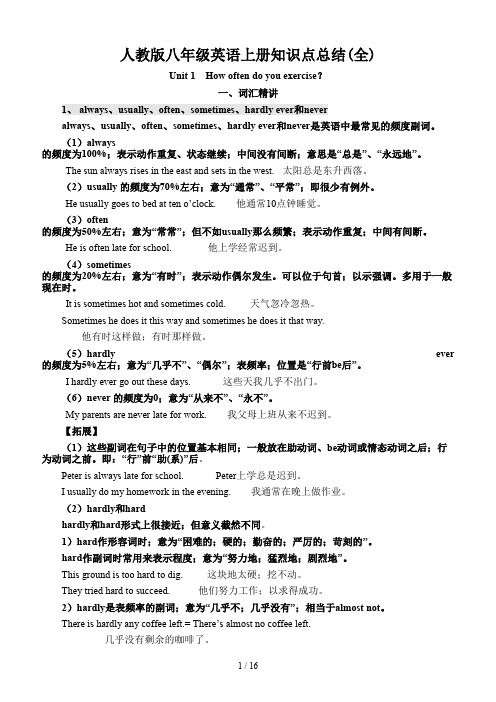
人教版八年级英语上册知识点总结(全)Unit 1 How often do you exercise?一、词汇精讲1、 always、usually、often、sometimes、hardly ever和neveralways、usually、often、sometimes、hardly ever和never是英语中最常见的频度副词。
(1)always的频度为100%;表示动作重复、状态继续;中间没有间断;意思是“总是”、“永远地”。
The sun always rises in the east and sets in the west. 太阳总是东升西落。
(2)usually 的频度为70%左右;意为“通常”、“平常”;即很少有例外。
He usually goes to bed at ten o’clock. 他通常10点钟睡觉。
(3)often的频度为50%左右;意为“常常”;但不如usually那么频繁;表示动作重复;中间有间断。
He is often late for school. 他上学经常迟到。
(4)sometimes的频度为20%左右;意为“有时”;表示动作偶尔发生。
可以位于句首;以示强调。
多用于一般现在时。
It is sometimes hot and sometimes cold. 天气忽冷忽热。
Sometimes he does it this way and sometimes he does it that way.他有时这样做;有时那样做。
(5)hardly ever 的频度为5%左右;意为“几乎不”、“偶尔”;表频率;位置是“行前be后”。
I hardly ever go out these days. 这些天我几乎不出门。
(6)never 的频度为0;意为“从来不”、“永不”。
My parents are never late for work. 我父母上班从来不迟到。
(完整版)人教版八年级上册英语unit1知识点及习题

Unit1 Where did you go on vacation一、书本重要语法点梳理go on vacation去度假 stay at home待在家里go to the mountains去爬山 go to the beach去海滩visit museums 参观博物馆 go to summer camp去参观夏令营quite a few相当多 study for为……而学习go out出去most of the time大部分时间taste good尝起来很好吃 have a good time玩得高兴]of course当然feel like给……的感觉;感受到go shopping去购物in the past在过去walk around四处走走because of因为one bowl of…一碗…… the next day第二天drink tea喝茶find out找出;查明go on继续 take photos照相something important重要的事 up and down上上下下come up出来buy sth. for sb. / buy sb. sth.为某人买某物taste + adj. 尝起来…… look+adj. 看起来……nothing…but+动词原形除了……之外什么都没有seem+(to be)+ adj. 看起来……arrive in+大地点 / arrive at+小地点到达某地decide to do sth.决定去做某事try doing sth.尝试做某事 try to do sth.尽力去做某事forget doing sth.忘记做过某事 forget to do sth.忘记做某事enjoy doing sth.喜欢做某事 want to do sth.想去做某事start doing sth.开始做某事 stop doing sth. 停止做某事dislike doing sth. 不喜欢做某事keep doing sth.继续做某事Why not do. sth.为什么不做……呢so+adj.+that+从句如此……以至于……tell sb. (not) to do sth. 告诉某人(不要)做某事1. on vacation 度假vacation意为“假期、假日”,相当于holiday,但vacation 表示长的假期。
(完整版)新人教版八年级英语上册unit1知识点总结

Unit 1 where did you go on vacation ➢单词复习:任何人Anywhere 精彩的;极好的最多的;大多数的没有什么n.没有。
每人;人人.我自己你自己;你亲自hen pig似乎;好像无聊的;厌烦的;郁闷的Someone Diary 活动;活跃。
决定;选定Paragliding bird bicycle building trader惊奇;想知道;怀疑差异;不同顶部;顶等;等待湿的;雨天的低于;在。
..下面饥饿的;渴望的如同;像.。
一样HillDuck不喜欢;厌恶短语归纳1、go on vacation去度假 ,2、stay at home 呆在家,3、go to the mountains 上山/进山,4、go to the beach到海边去,5、visit museums 参观博物馆,6、go to summer camp 去夏令营,7、quite a few 相当多,8、study for为……学习,9、go out 出去,10、most of the time 大部分时间/绝大多数时间,11、taste good 尝起来味道好,12、have a good time玩的开心,13、of course当然可以,14、feel like(doing sth)感觉像……/想要,15、go shopping购物,16、in the past 在过去,17、walk around绕……走,18、too many 太多(可数名词前面),19、because of 因为,20、one bowl of 一碗……,21、find out 查出来/发现,22、go on继续,23、take photos 照相,24、something important重要的事情,25、up and down上上下下,26、come up出来➢习惯用法、搭配1. buy sth。
for sb.=buy sb. sth。
完整版)人教版八年级英语上册第一单元知识点总结

完整版)人教版八年级英语上册第一单元知识点总结Grade: 8th student name: Tutoring subject: English Teaching teacher: Teacher ShaoTopic: Unit 1 Where did you go on n?Type of class: Preview class。
synchronous class。
review class。
exercise classKey points:1.Mastering key phrases2.Understanding the usage of indefinite pronouns3.Analyzing words and phrasesTeaching content:1.Important grammar pointsUnit 1 Where did you go on n。
go on nstay at homego to the mountainsgo to the beachvisit museumsquite a fewstudy formost of the timetaste goodhave a good timefeel likego shoppingwalk aroundbecause ofone bowl ofthe next dayfind outgo ontake photossomething importantup and downcome upbuy sth。
for sb。
/ buy sb。
sth。
taste + adj。
look + adj。
nothing but + verbseem + (to be) + adj。
arrive in + big place / arrive at + small place decide to do sth。
try doing sth。
人教版英语八年级上册重点知识点汇总
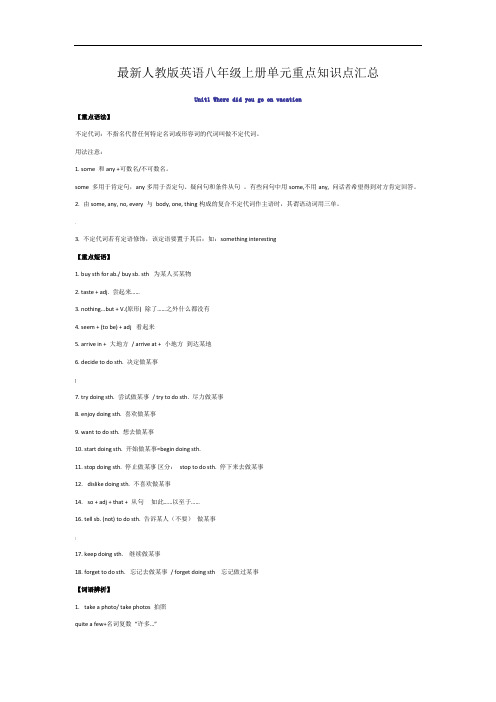
最新人教版英语八年级上册单元重点知识点汇总Unit1 Where did you go on vacation【重点语法】不定代词:不指名代替任何特定名词或形容词的代词叫做不定代词。
用法注意:1. some 和any +可数名/不可数名。
some 多用于肯定句,any多用于否定句、疑问句和条件从句。
有些问句中用some,不用any, 问话者希望得到对方肯定回答。
2. 由some, any, no, every 与body, one, thing构成的复合不定代词作主语时,其谓语动词用三单。
.3. 不定代词若有定语修饰,该定语要置于其后:如:something interesting【重点短语】1. buy sth for ab./ buy sb. sth 为某人买某物2. taste + adj. 尝起来……3. nothing...but + V.(原形) 除了……之外什么都没有4. seem + (to be) + adj 看起来5. arrive in + 大地方/ arrive at + 小地方到达某地6. decide to do sth. 决定做某事]7. try doing sth. 尝试做某事/ try to do sth. 尽力做某事8. enjoy doing sth. 喜欢做某事9. want to do sth. 想去做某事10. start doing sth. 开始做某事=begin doing sth.11. stop doing sth. 停止做某事区分:stop to do sth. 停下来去做某事12. dislike doing sth. 不喜欢做某事14. so + adj + that + 从句如此……以至于……16. tell sb. (not) to do sth. 告诉某人(不要)做某事;17. keep doing sth. 继续做某事18. forget to do sth. 忘记去做某事/ forget doing sth 忘记做过某事【词语辨析】1. take a photo/ take photos 拍照quite a few+名词复数“许多…”2. seem + 形容词看起来…... You seem happy toda y.seem + to do sth. 似乎/好像做某事 I seem to have a coldIt seems + 从句似乎..…. It seems that no one believe you.【seem like ... 好像,似乎….. It seems like a good idea.3. arrive in +大地点= get to= reach+地点名“到达......”arrive at +小地点(注:若后跟地点副词here/there/home, 介词需省略,如:arrive here; get home)4. feel like sth 感觉像…feel doing sth. 想要做某事5. wonder(想知道)+疑问词(who, what, why)引导的从句。
人教版英语八年级上册第一单元知识点总结

Unit11. 疑问词how的用法(1)用什么手段,方法/交通工具How did he do it? / I don’t know how to swim.How do you come to school?(2) 情况如何(指身体健康状况)How are you?(3) how many,how much表示“多少”how many后接可数名词复数,how much接不可数名词。
(4) how often是对动作发生的“次数”提问,询问的是频率“多久一次”(5) How old...? 询问年龄How old are you? I am five.(6) How about…? ……如何?……怎么样?How about going to the movies?2. time表示不可数名词,意为“时间”。
What time is it?表示可数名词,意为“次数,倍数”--------注意“次数”的表达方法一次 once,两次 twice,三次或三次以上用基数词加上times:three times、five times、one hundred times.表示“……几次”的表达方法是:once a day/ a week/ a month/ a year twice a day/ a week/ a month/ a year 3.How often do you shop?/How often do you exercise?--------exercise v/n shop v/ n1)He often exercises on weekends. We often do / take exercise(做运动)on weekends.2)We often shop on weekends. There are many shops in the neighborhood.4. As for homework, most students do homework every day.------as for意为“就……而论”,“至于”5. want to do sth. 想要做某事want sb. to do sth. 想要某人干某事ask sb. to do sth. 叫某人做某事tell sb. to do sth. 告诉某人去做某事help sb. (to) do sth. 帮助某人做某事6. be good for...表示“对……有益(有好处)”be bad for... 对……有害/无益It's good for us to do more reading. 多读书对我们有好处。
初二上册英语第一单元

初二上册英语第一单元初二上册英语第一单元人教版的主要知识点总结如下:1. 自我介绍:学生学习如何用英语进行自我介绍,包括姓名、年龄、家庭成员等基本信息。
2. 问候语:学生学习常用的问候语,如"Hello!"、"Hi!"、"Good morning/afternoon/evening!"等,并学会回答这些问候语。
3. 询问个人信息:学生学习如何用英语询问他人的个人信息,如"What's your name?"、"How old are you?"、"How many people are there in your family?"等,并学会回答这些问题。
4. 家庭成员:学生学习如何用英语表达自己的家庭成员,如"father"、"mother"、"brother"、"sister"等,并学会描述家庭成员的关系。
5. 职业:学生学习如何用英语表达不同的职业,如"teacher"、"doctor"、"engineer"等,并学会描述自己或他人从事的职业。
6. 喜好:学生学习如何用英语表达自己的喜好,如"I like..."、"I don't like..."等,并学会询问他人的喜好。
7. 日常活动:学生学习如何用英语描述自己的日常活动,如"I usually go to school by bike."、"I often watch TV in the evening."等,并学会询问他人的日常活动。
8. 时间表达:学生学习如何用英语表达不同的时间,如"in the morning/afternoon/evening"、"at seven o'clock"等,并学会询问和描述具体的时间。
Units1-4单元复习知识点人教版八年级英语上册

第一单元重点语法【一般过去时】1.概念:表示过去某个时间里发生的动作或状态;过去习惯性、经常性的动作、行为;过去主语所具备的能力和性格。
2.时间标志词1. yesterday, the day before yesterday2. 时间段+ago: three years ago, long ago…3. last: last day/ week/ year…4. in+过去年份: in 2015…5. just now 刚才【复合不定代词】复合不定代词是由some-,any-,no-,every-加上-one,-body,-thing等所组成的不定代词。
例如:Everyone wants to win.考向二:复合不定代词被形容词修饰,形容词后置例如:I have something interesting to tell you.考点三:辨析something/someone/somebody,anything/anyone/anybody,nothing/noone/nobody,everything/everyone/everybody1.something,someone,somebody通常用于肯定句中2.anything,anyone,anybody一般用于否定句、疑问句或条件状语从句中。
3. not....anything = nothing注意:1)在表示请求、邀请、提建议等带有委婉语气的疑问句,和希望得到对方肯定答复的疑问句,以及表示反问的问句中,也用something,someone,somebody等复合不定代词。
如:Would you like something to eat?2)当anything表示“任何事(物),无论何事(物)”,anyone,anybody表示“无论谁,任何人”等意义时,它们也可以用于肯定句中。
如:Anybody knows the answer.任何人都知道答案。
八年级上册第一单元英语知识点
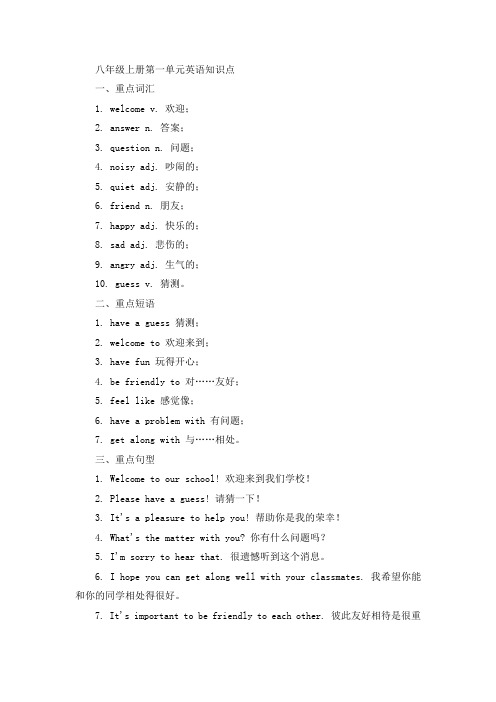
八年级上册第一单元英语知识点一、重点词汇1. welcome v. 欢迎;2. answer n. 答案;3. question n. 问题;4. noisy adj. 吵闹的;5. quiet adj. 安静的;6. friend n. 朋友;7. happy adj. 快乐的;8. sad adj. 悲伤的;9. angry adj. 生气的;10. guess v. 猜测。
二、重点短语1. have a guess 猜测;2. welcome to 欢迎来到;3. have fun 玩得开心;4. be friendly to 对……友好;5. feel like 感觉像;6. have a problem with 有问题;7. get along with 与……相处。
三、重点句型1. Welcome to our school! 欢迎来到我们学校!2. Please have a guess! 请猜一下!3. It's a pleasure to help you! 帮助你是我的荣幸!4. What's the matter with you? 你有什么问题吗?5. I'm sorry to hear that. 很遗憾听到这个消息。
6. I hope you can get along well with your classmates. 我希望你能和你的同学相处得很好。
7. It's important to be friendly to each other. 彼此友好相待是很重要的。
8. Let's work together to solve the problem! 让我们一起努力解决这个问题吧!9. You can ask for help if you have any problems. 如果你有问题,可以寻求帮助。
10. It's a good way to make new friends. 交新朋友是个不错的方式。
新人教版八年级英语上册unit1知识点总结
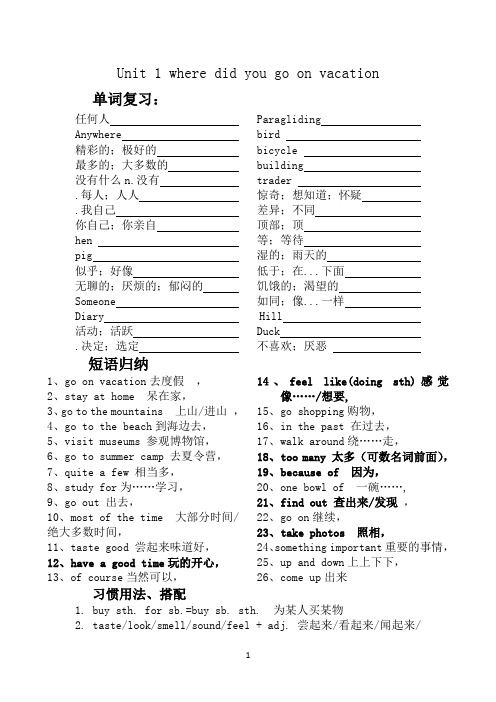
Unit 1 where did you go on vacation 单词复习: 任何人 Anywhere 精彩的;极好的 最多的;大多数的 没有什么n.没有 .每人;人人 .我自己 你自己;你亲自 hen pig 似乎;好像 无聊的;厌烦的;郁闷的 Someone Diary 活动;活跃 .决定;选定 Paragliding bird bicycle building trader 惊奇;想知道;怀疑 差异;不同 顶部;顶 等;等待 湿的;雨天的 低于;在...下面 饥饿的;渴望的 如同;像...一样 Hill Duck 不喜欢;厌恶 短语归纳1、go on vacation 去度假 ,2、stay at home 呆在家,3、go to the mountains 上山/进山 ,4、go to the beach 到海边去,5、visit museums 参观博物馆,6、go to summer camp 去夏令营,7、quite a few 相当多,8、study for 为……学习,9、go out 出去,10、most of the time 大部分时间/绝大多数时间,11、taste good 尝起来味道好,12、have a good time 玩的开心,13、of course 当然可以, 14、feel like(doing sth)感觉像……/想要, 15、go shopping 购物, 16、in the past 在过去, 17、walk around 绕……走, 18、too many 太多(可数名词前面), 19、because of 因为, 20、one bowl of 一碗……, 21、find out 查出来/发现 , 22、go on 继续, 23、take photos 照相, 24、something important 重要的事情, 25、up and down 上上下下, 26、come up 出来习惯用法、搭配1. buy sth. for sb.=buy sb. sth. 为某人买某物2. taste/look/smell/sound/feel + adj. 尝起来/看起来/闻起来/听起来/摸起来……3. have nothing to do but + V.(原形) 除了……之外什么都没有There was nothing much to do in the evening but read.晚上除了读书以外无事可做。
人教版初中英语八年级上册Unit1知识点总结
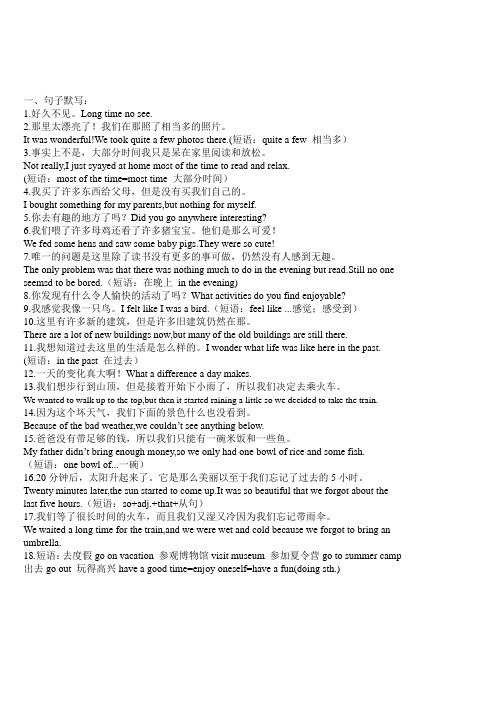
一、句子默写:1.好久不见。
Long time no see.2.那里太漂亮了!我们在那照了相当多的照片。
It was wonderful!We took quite a few photos there.(短语:quite a few 相当多)3.事实上不是,大部分时间我只是呆在家里阅读和放松。
Not really,I just syayed at home most of the time to read and relax.(短语:most of the time=most time 大部分时间)4.我买了许多东西给父母,但是没有买我们自己的。
I bought something for my parents,but nothing for myself.5.你去有趣的地方了吗?Did you go anywhere interesting?6.我们喂了许多母鸡还看了许多猪宝宝。
他们是那么可爱!We fed some hens and saw some baby pigs.They were so cute!7.唯一的问题是这里除了读书没有更多的事可做,仍然没有人感到无趣。
The only problem was that there was nothing much to do in the evening but read.Still no one seemsd to be bored.(短语:在晚上in the evening)8.你发现有什么令人愉快的活动了吗?What activities do you find enjoyable?9.我感觉我像一只鸟。
I felt like I was a bird.(短语:feel like ...感觉;感受到)10.这里有许多新的建筑,但是许多旧建筑仍然在那。
There are a lot of new buildings now,but many of the old buildings are still there.11.我想知道过去这里的生活是怎么样的。
人教版八年级上册英语Unit 1 知识点语法归纳总结
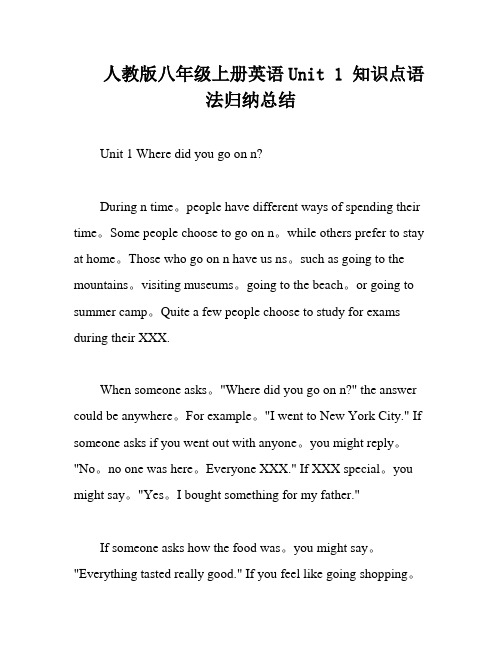
人教版八年级上册英语Unit 1 知识点语法归纳总结Unit 1 Where did you go on n?During n time。
people have different ways of spending their time。
Some people choose to go on n。
while others prefer to stay at home。
Those who go on n have us ns。
such as going to the mountains。
visiting museums。
going to the beach。
or going to summer camp。
Quite a few people choose to study for exams during their XXX.When someone asks。
"Where did you go on n?" the answer could be anywhere。
For example。
"I went to New York City." If someone asks if you went out with anyone。
you might reply。
"No。
no one was here。
Everyone XXX." If XXX special。
you might say。
"Yes。
I bought something for my father."If someone asks how the food was。
you might say。
"Everything tasted really good." If you feel like going shopping。
you might say。
人教版八年级英语上册第一单元重点词汇及句型Unit 1

人教版八年级(上)英语第一单元重点词汇句型一.单词:不定代词:someone/somebody, anyone/anybody, everyone/everybody, no one/nobody something, anything, everything, nothing不定副词:somewhere, anywhere, everywhere, nowhere反身代词:myself, ourselves, yourself, yourselves, himself, herself, itself, themselves bore—(adj.) bored/bored enjoy—(adj.) enjoyable decide—(n.) decision build—(n.) building different—(n.) difference like--(反义词)dislike二.短语1. 去中央公园go to Central Park2. 打沙滩排球play beach volleyball3. 看到奇妙的黄果树瀑布see wonderful Huangguoshu Waterfall4.很少little(+不可数名词), few(+可数名词复数)5.一些a little (+不可数名词), a few(+可数名词复数)6.相当多quite a little (+不可数名词), quite a few(+可数名词复数)7. 大部分时间呆在家看书休息stay at home most of the time to read and relax8. 给我爸买顶帽子(2)buy my father a hat/buy a hat for my father9. 玩得愉快(3)have fun/have a great time/enjoy oneself10. 喂些母鸡和小猪feed some hens and baby pigs 11. 家常菜home cooking12. 一个令人愉快的活动an enjoyable activity 13. 到达(3)reach/get to/arrive at (in)14. 决定(不)做某事decide to do sth, decide not to do sth15. 在沙滩上尝试滑翔伞try paragliding on the beach 尝试做某事try doing sth16. 努力学好英语try to learn English well 努力做/不做某事try to do sth, try not to do sth17. 吃些特别的东西当午餐eat something special for lunch18. 骑自行车去学校ride a bicycle to school 骑自行车回家ride a bicycle home19. 建一座新桥(过去式)build a new bridge 20. 许多新建筑物many buildings21. 百年前中国商人的房子the houses of the Chinese traders from 100 years ago22. 喜欢环城漫步enjoy walking around the town 23. 有影响,有关系make a difference 24. 说出A与B的区别tell differences between A and B 25. 与…不一样be different from 26. 走上山顶walk up to the top of the hill 27. 开始下毛毛雨start to rain a little28. 等火车等了一个多小时wait over an hour for the train29. 等待某人/某物wait for sb/sth 30. 等着(某人)做某事wait (for sb) to do sth30. 雨下得大(2)rain hard/heavily 31. 忘记带雨伞forget to bring an umbrella 32. 又湿又冷be wet and cold 33. 感觉又累又饿feel tired and hungry 34. 又走了两小时walk for another two hours 35. 又吃了三个苹果eat another three apples 36. 参观天安门广场visit Tian’anmen Square37. 在故宫学到重要的知识learn something important in the Palace Museum38. 吃美味的北京烤鸭eat delicious Beijing duck39. 告诉我们关于你的喜恶tell us about your likes and dislikes40. 不喜欢吃蔬菜dislike to eat vegetables 41. 对…感兴趣be interested in…42. 对…厌倦(2)be tired of/be bored with43. 如此…以致于so…that…44. 让我坚持前进tell me to keep going 45. 继续做某事(2)go on doing/to do sth 46. 激动地做某事do sth in excitement47. 二十分钟以后(2)twenty minutes later/after twenty minutes三.重点句型:1、-你假期去哪了? -我去爬山了。
最全面人教版八年级上册英语第一单元知识点归纳总结
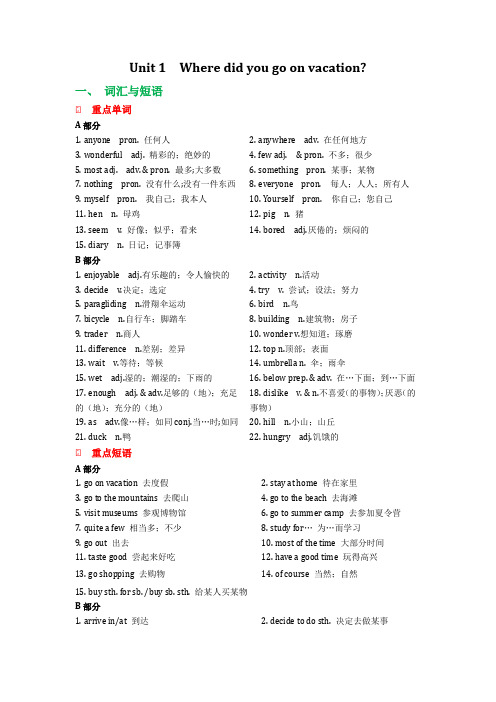
Unit 1 Where did you go on vacation?一、词汇与短语● 重点单词A部分1.anyone pron. 任何人2.anywhere adv. 在任何地方3.wonderful adj. 精彩的;绝妙的4.few adj. & pron. 不多;很少5.most adj. adv. & pron. 最多;大多数6.something pron. 某事;某物7.nothing pron. 没有什么;没有一件东西8.everyone pron. 每人;人人;所有人9.myself pron. 我自己;我本人10.Yourself pron. 你自己;您自己11.hen n. 母鸡12.pig n. 猪13.seem v. 好像;似乎;看来14.bored adj.厌倦的;烦闷的15.diary n. 日记;记事簿B部分1.enjoyable adj.有乐趣的;令人愉快的2.activity n.活动3.decide v.决定;选定4.try v. 尝试;设法;努力5.paragliding n.滑翔伞运动6.bird n.鸟7.bicycle n.自行车;脚踏车8.building n.建筑物;房子9.trader n.商人10.wonder v.想知道;琢磨11.difference n.差别;差异12.top n.顶部;表面13.wait v.等待;等候14.umbrella n. 伞;雨伞15.wet adj.湿的;潮湿的;下雨的16.below prep. & adv. 在…下面;到…下面17.enough adj. & adv.足够的(地);充足的(地);充分的(地)18.dislike v. & n.不喜爱(的事物);厌恶(的事物)19.as adv.像…样;如同conj.当…时;如同20.hill n.小山;山丘21.duck n.鸭22.hungry adj.饥饿的● 重点短语A部分1.go on vacation 去度假2.stay at home 待在家里3.go to the mountains 去爬山4.go to the beach 去海滩5.visit museums 参观博物馆6.go to summer camp 去参加夏令营7.quite a few 相当多;不少8.study for…为…而学习9.go out 出去10.most of the time 大部分时间11.taste good 尝起来好吃12.have a good time 玩得高兴13.go shopping 去购物14.of course 当然;自然15.buy sth. for sb. /buy sb. sth. 给某人买某物B部分1.arrive in/at 到达2.decide to do sth. 决定去做某事3.try doing sth. 尝试做某事4.forget to do sth. 忘记做某事5.feel like给的感觉;感受到6.in the past 在过去7.wait for 等候8.because of 因为9.the next day 第二天10.take photos 照相11.find out 找出;查明12.up and down 上上下下● 重点句子A部分1.Where did you go on vacation? 你去哪儿度假了?2.Long time no see.好久不见。
八上英语人教版第一单元知识点

八上英语人教版第一单元知识点八上英语人教版第一单元的知识点包括:
1.描述人物外貌和性格特征:
-外貌:形容词描述人的外貌特征,如:tall(高的)、short (矮的)、thin(瘦的)等。
-性格:形容词描述人的性格特点,如:friendly(友好的)、kind(善良的)、hardworking(努力的)等。
2.打招呼和介绍自己:
-打招呼:问候语和回答问候语,如:How are you?(你好吗?)和I'm fine, thank you.(我很好,谢谢。
)
-介绍自己:告诉别人自己的名字、年龄、国籍等个人信息,如:My name is…(我叫……)和I am…years old.(我……岁了。
)
3.数字和电话号码:
-数字:英语中的数字读法和书写形式,如:one(一)、two (二)、three(三)等。
-电话号码:问电话号码和告诉电话号码的表达方式,如:What's your telephone number?(你的电话号码是多少?)和My telephone number is…(我的电话号码是……)。
4.询问和回答国籍和所在地:
-询问:Where are you from?(你来自哪里?)
-回答:I am from…(我来自……)。
5.询问和回答年龄:
-询问:How old are you?(你几岁?)
-回答:I am…years old.(我……岁了。
)
以上是八上英语人教版第一单元的主要知识点,希望对你有帮助!。
- 1、下载文档前请自行甄别文档内容的完整性,平台不提供额外的编辑、内容补充、找答案等附加服务。
- 2、"仅部分预览"的文档,不可在线预览部分如存在完整性等问题,可反馈申请退款(可完整预览的文档不适用该条件!)。
- 3、如文档侵犯您的权益,请联系客服反馈,我们会尽快为您处理(人工客服工作时间:9:00-18:30)。
He came back after two hours. 他是两小时后回来的。
?2. less, fewer 比较少;more 比较多
?? less 是little 的比较级,修饰不可数名词
? ?fewer是few的比较级,修饰可数名词
词汇拓展
常用搭配:such as 例如??? such and such 某某;这样那样的
谚语:There's no such thing as a free lunch. 世上没有免费的午餐。
Unit 1 Will people have robots? 词汇(3)
人民教育出版社
???
(2)put on 意思是“穿(戴)上”,强调动作。例如:He put on his coat and went out. 他穿上大衣就出去了。
(3)wear意思是“穿(戴)着”,强调状态。例如:Lucy's mother often wears a pair of glasses. 露西的母亲常常戴着一副眼镜。
?3. fall in love with?...? ?爱上……
Last year I visited the art exhibition and fell in love with the work of Picasso.
去年我参观了艺术展,爱上了毕加索的作品。
?
4. a kind of?...? ?一种;some kinds of?...? ?几种
示例
He noticed her necklace. Such jewels must have cost a lot, he thought. 他注意到了她的项链。他想,这样的首饰肯定价格不菲。
用法
辨析such 和so:
(1)such 是形容词,意思是“这(那)样的;这(那)种;如此的”,修饰名词。例如:I have never seen such a beautiful place before. 我从未见过这么美的地方。需要特别注意的是,such修饰单数可数名词时,应该按照如下词序:such + a / an + 形容词 + 单数可数名词。
词汇扩展
常用搭配:fall asleep 入睡??? fall behind 落后于(某人或某物)
??????????????????????? fall down 跌落???? fall in love with 喜爱;爱上
???????? ????????????? ?fall off 掉下?????? fall over 跌落;被绊倒
辨析dress,put on 和wear:
(1)用作动词时,dress既可以表动作,也可以表状态,常用人作宾语,意思是“……穿衣服”,例如:She is only a girl of three. She can't dress herself. 她只是一个三岁的女孩,她还不能自己穿衣服。需要注意的是,在表示“给自己穿衣”时,我们通常说dress oneself (= get dressed);当dress表示状态时,一般要用be dressed in 结构,例如:She was dressed in a red coat. 她穿着一件红色的上衣。
Unit 1 Will people have robots? 词汇(1)
人民教育出版社
?1. fall ?v.?come or go down from force of weight, loss of balance, etc; drop; become?落下;跌落;变成
示例
The book fell off the shelf. 这本书从架子上掉了下来。
?????? I don't like going out alone after dark. 我不愿意天黑后独自外出。
用法
解析along 和lonely:
(1)alone 既可用作形容词,又可用作副词,意思是“独自的(地);单独的(地)”,侧重于说明独自一人,没有同伴或助手。alone和on one's own,by oneself意思相近。alone用作形容词时,一般与be 动词连用,在句中作表语。例如:She is alone at home. 她独自一人在家。alone 用作副词修饰动词时,放在动词后面作状语。例如:I like to work alone. 我喜欢独自一人工作。alone 用作副词时,也可作定语,意思是“只有;仅仅”,但必须置于它所修饰的名词或代词之后。例如:This year alone, we've already planted ten thousand trees. 仅是今年,我们已经载了一万颗树。
用法
hundred 用于数词或含有数量意义的词之后,一般不用复数形式,例如:three hundred, a few hundred 等。但当hundred 表示“成百的;许多的”意思时,它面前不用具体数字,而常用hundreds of 结构。注意hundred 在这个结构中要用复数形式,前面可加some,a few,several等词修饰。例如:Her coat cost hundreds of dollars. 她的大衣价值几百美元。类似的搭配还有thousands of数以千计的;许多的,millions of 数以百万计的;无数的。
词汇拓展
常用搭配:let / leave somebody / something alone 不干涉某人或某物;听其自然
????????? ?????????????? let alone 不管;不必考虑
谚语:An evil chance seldom comes alone. 祸不单行
a kind of book? ?一种书
five kinds of flowers?? 五种花
many different kinds of goldfish?? 各种不同的金鱼
?
3. dress ?v.?put clothes on yourself or someone else?穿衣
示例
Is she old enough to dress herself yet? 她会自己穿衣服了吗?
用法
dress还可以用作名词,表示“女服;连衣裙;服装”。例如:Mary wore a long red dress last evening. 玛丽昨晚穿了件红色的连衣长裙。
? ?more 是much和many的比较级
much 修饰不可数名词,many修饰可数名词
I have less money than he has. 我的钱比他的少。
There are more building in this city than in that city.
这个城市的楼房比那个城市多。
词汇扩展
常用搭配:dress (somebody) up (in something / as somebody or something) 化妆打扮
谚语:Eat to please myself, but dress to please others. 吃是使自己受用,穿是使别人受用
Unit 1 Will people have robots? 词汇(2)
(2)so是副词,意思是“这(那)么;这(那)样;如此地”,修饰形容词、副词和分词。例如:I have never seen so beautiful a place before. 我从未见过这么美的地方。同样,需要特别注意的是,so修饰单数可数名词时,应该按照如下词序:so + 形容词 + a / an + 单数可数名词。此外,当名词前有few,many,little,much等修饰词时,要用so。例如:so many people,so few days,so much time,so little money等。
谚语:He who does not advance falls backward. 不进则退。
?????????????????Pride goes before a fall. 骄兵必败。
?
2. alone?adv.?? Without any companions?独自地;孤独地
示例
词汇拓展
谚语:One good head is better than a hundred strong hands. 上百双有力的手,不如一个聪明的头脑。
To hear a hundred times is not so good as to see once. 百闻不如一见。
?
3. such?adj.?of the same kind as the thing or person which has already been mentioned?这(那)样的;这(那)种
人民教育出版社
1. unpleasant?adj. not pleasant; not enjoyable?使人不愉快的;不合意的
示例
There is an unpleasant smell from this room. 这屋子里散发出一种难闻的气味。
用法
unpleasant可以表示“令人不快的;讨厌的”,例npleasant. 我觉得他的态度讨厌极了。
(2)lonely只用作形容词,它在句中既可作定语,也可作表语,表示“孤独的;寂寞的”。该词带有“孤寂”的感情色彩。用作定语时,意思为“孤单的;荒凉的;偏僻的”等。例如:That's a lonely island. 那是一个荒凉的岛屿。Lonely用作表语时,可以表示“孤寂的;寂寞的”。例如:I was alone but I didn't feel lonely. 我独自一人,但我并不感到孤独。
